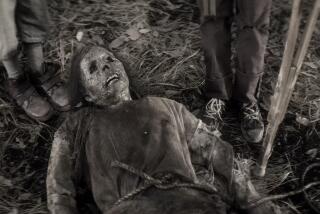TWO VIEWS OF THE UNDERCLASS : Feudalism in the ‘60s Comes Under Fire in Spanish-Language Film ‘Holy Innocents’
- Share via
Mario Camus’ “The Holy Innocents” (at the Los Feliz and the Monica) is at once an irresistible family saga and a corrosive, gratifying social satire set against Franco’s Spain of the 1960s.
It has that breath of life, that sense of abundance and impassioned commitment that mark only the finest films. Subtle, expressive, heartbreaking and sometimes outrageously funny, it is so complete a triumph of judgment and control, yet seems so spontaneous, that it’s impossible to imagine it other than as it is. On the one hand, it brings to mind Olmi’s “The Tree of Clogs,” and on the other, Renoir’s “The Rules of the Game.” It does, in fact, rank in such exalted company.
Adapted by Camus and others from the Miguel Delibes novel, “The Holy Innocents” comprises four flashbacks to the recent past, framed by a young soldier’s visit to his parents, peasants living on a great estate in Northern Spain. In moving back and forth in time, we are taken into a way of life so utterly feudal that the sight of a modern tractor is jarring.
All his life, Paco (Alfredo Landa) has faithfully served the noble Crespi family. In a remote stone hut he and his wife (Terele Pavez), a worn, handsome woman, have raised three children: their gravely beautiful, rapidly maturing elder daughter (Belen Ballesteros); a son (Juan Sachez), soon to do his military service, and their paralyzed, totally helpless younger daughter (Susana Sanchez). For all the timelessness of the family’s existence, Sachez and Ballesteros are nevertheless determined to leave for the city.
Soon the family will have the added burden of the wife’s sweet, retarded but hopelessly unkempt older brother (Francisco Rabal, star of some of Bunuel’s finest films). Ostensibly as a reward for its services, the family is to be moved close to the main house where they will have electricity for the first time. Yet proximity to their masters only renders them more vulnerable to exploitation.
As an expose of an ancient hierarchical society preserved by Franco, “The Holy Innocents” would seem to have boldly loaded the dice: The more we know of the peasant family, the more we discover their innate goodness, whereas the more we learn of their masters, the more we see their cruelty and folly. Yet for all the film’s satirical thrusts at aristocrats, its makers recognize that the true evil here is the feudalism under which everyone lives, a system that renders the haves blind to the rights of the have-nots and the have-nots ignorant of what is innately theirs as human beings. Indeed, the masters tend to forget that their retainers are humans, not animals.
Obviously, such a situation is ripe for ironic, highly critical contrast, but what makes “The Holy Innocents” so constantly rewarding is the light touch Camus and his writers bring to their angry yet calmly detached perceptions. Camus’ superb mastery of tone allows him to range from a daring re-creation of the Pieta, with Rabal holding the pathetic Sanchez in his arms, to the high comedy of the marquesa’s visit to her estate.
Her arrival is marked by her peasants standing in line to receive her polite inquiries as to their well-being and some coins--she does care about them; she just doesn’t realize how superficial her concern is. Her departure is just as grand, as she receives on a high balcony her serfs’ blessings--”Viva la Marquesa!”
The crux of the film is Paco’s breaking his leg while serving as a tracker for the marquesa’s son, the Young Master (Juan Diego, in an icy portrayal), an obsessive hunter. The Young Master has a genuine affection for Paco--much as he would for a good hunting dog--but what to do, with the big shoot coming up? You’ve been warned as to what’s coming, but you still can’t believe it will actually happen: Can the Young Master insist that Paco, his broken leg in a cast up to his hip, go on the hunt even if it means he may be left crippled for life?
There’s a consistent sense of rightness about “The Holy Innocents”: always revealing images, wonderfully rhythmic pacing, spare use of music and glorious, understated acting. No wonder Landa and Rabal split the best-actor honors at Cannes last year--Landa’s Paco, endlessly obliging, endlessly used; Rabal, the film’s holiest innocent, a man sustained by his love for his pet hawk and his pathetic niece. And then there’s Terele Pavez’s wife and mother, as much a compassionate pillar of strength as Ma Joad.
“Some below, others above--it’s the law of life,” says the Young Master, complaining that Paco’s son and his generation aren’t as respectful as their parents. It’s a belief “The Holy Innocents” (Times-rated Mature) challenges with every frame.
‘THE HOLY INNOCENTS’ (Los Santos Inocentes)
A Samuel Goldwyn Co. release of Ganesh Producciones/Television Espanola. Producer Julian Mateos. Director Mario Camus. Screenplay Antonio Larreta, Manuel Matiji, Camus; based on the novel by Miguel Delibes. Camera Hans Burmann. Music Anton Garcia Abril. Art director Rafael Palmero. Film editor Jose Maria Biurrun. With Alfredo Landa, Francisco Rabal, Terele Pavez, Belen Ballesteros, Juan Sachez, Susana Sanchez, Agata Lys, Agustin Gonzalez, Juan Diego, Mary Carillo, Maribel Martin, Jose Guardiola, Manuel Zarzo. In Spanish, with English subtitles.
Running time: 1 hour, 48 minutes.
Times-rated: Mature.
More to Read
Only good movies
Get the Indie Focus newsletter, Mark Olsen's weekly guide to the world of cinema.
You may occasionally receive promotional content from the Los Angeles Times.










